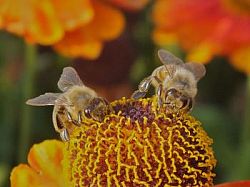Honey packer commits another £100k to support bees
The Laboratory of Apiculture and Social Insects (LASI) has been boosted by further support from Rowse Honey Ltd.
 LASI research also investigates which garden plants are good for bees.
LASI research also investigates which garden plants are good for bees.
In 2009, the company donated £100,000 to help launch the Sussex Plan for honey bee health and well-being, a long-term research project designed to advance practical knowledge of honey bees and social insects. Now, they have renewed their commitment with another £100,000 to extend their support of this important work until 2015.
The grant comes at a vital time as last summer was one of the toughest yet for our bees. The cool, wet weather conditions meant that many bees were confined to their hives and forced to survive off their honey stores. Bees normally feed on honey produced over the summer during the winter months. If their stores are lower than usual it will make the winter even more difficult and may require the intervention of beekeepers to prevent mass starvation.
Another effect of the poor summer is its impact on the process of queen production. Virgin queens mate on the wing on fine, still summer days. If conditions prevent them from flying then queens may be poorly mated and unable to produce sufficient new brood to see colonies through the winter.
Such issues only highlight the importance of the Sussex Plan, which investigates practical questions that will help to address the wide range of challenges currently facing honey bees, including lack of forage, parasites and diseases.
Already, LASI researchers are using waggle dance decoding to determine where the bees are foraging and are studying areas that have been shown to be important to bees during the most difficult foraging summer months.
They are also conducting studies of natural disease resistance and investigating the best garden plants for bees.
James Skidmore, Managing Director for Rowse Honey, is only too aware of the challenges: "2012 was a difficult year for food producers, but we recognise the need to support activities in our area of the food industry, like the Sussex Plan for Honey bee health and well-being."
Professor Francis Ratnieks is delighted with the relationship with Rowse: "This support will be vital in maintaining the Sussex Plan, given the challenging funding climate. Rowse were our first corporate donor, and their initial donation played a key role in getting the Sussex Plan going, turning it from an idea into reality. It is very encouraging to me and the whole LASI team that Rowse will be supporting us for a further three years."
